10 tools you need in your marketing agency tech stack
Looking to build out your marketing agency tech stack? Here are my 10 favorite tools I use ever single week to run my content marketing agency.

Running a marketing agency will drive you crazy — it did to me.
But that only happened because I was disorganized and didn’t realize there were parts of my business I could automate. You don’t know what you don’t know, I guess.
With the rise of AI tools and LLMs, as an agency owner, you owe it to yourself to take some time to study what software you can use to ease some of the headaches of running an agency. You’d be surprised at how advanced technology has become in just the past year alone.
Pretty soon, we’ll have AI agents that run most of our daily operations for us. But until that day comes, I’m going to go through some of the tools I personally use in my marketing agency tech stack.
Chances are, you’re already using a certain set of tools to run your agency or freelance marketing business. So, in this article, I won’t give you a list of tools that all do the same thing. Rather, I’m going to go over tools I use myself every week (some even daily).
Let’s get into it.
What to consider when building your marketing agency tech stack
When we think about the areas of a marketing agency tech stack, we want to make sure we remove the “tools” and think only about the “outcomes” we want for our clients.
This way, we can figure out what tools best service those outcomes. And of course, while we can’t always control outcomes (dare I say, never), we can control the inputs. So we’ll work backward from: desired outcomes → inputs required → tools needed.
With this framework in mind, here are areas to consider when trying to create the best possible experience for your clients and your internal team:
- Communication and reporting: Beyond just email and Slack messages, communicating your work and progress to your clients is how you make them trust you and have a good experience. Things like a self-serve client portal that integrates with tools your client may already be using is a great way to make the process of integrating your agency with their company a breeze. We’ll go over some tools that can help you do this in the next section.
- Processing payments: Having tools that allow you to not only send branded invoices but also set up subscriptions (so you can productize your services) is key to getting paid on time. We’ll go over a tool that allows you to do this.
- Finding new clients: Beyond just word of mouth, marketing your agency to attract new clients allows you to have a steady stream of work and income. We’ll go over some tools that are loved by many tech-focused agencies right now.
- Managing projects: Managing your projects, both internally and externally, is an art. Tools like Asana and Trello are known to be some of the most used task managers out there. But, I’ll go over some other tools that I think add a bit more functionality.
Now that we have a general idea of what we should look for in our agency tech stack, let’s go over 10 tools that serve all of these outcomes.
10 essential tools for your marketing agency stack
Here are my top picks for the must-have tools in your marketing agency tech stack:
- Assembly (best for client portals and billing)
- Clay (best for outbound marketing)
- Webflow (best for building your agency website)
- Notion (best for internal knowledge base)
- Ahrefs (best for SEO analysis)
- Looker Studio (best for reporting dashboards)
- Clearscope (best for creating SEO-optimized content)
- Ordinal (best for social media management)
- Proposify (best for creating and sending proposals)
- Zapier (best for creating automations)
Alright, let's take a deeper look at what each tool does.
1. Assembly
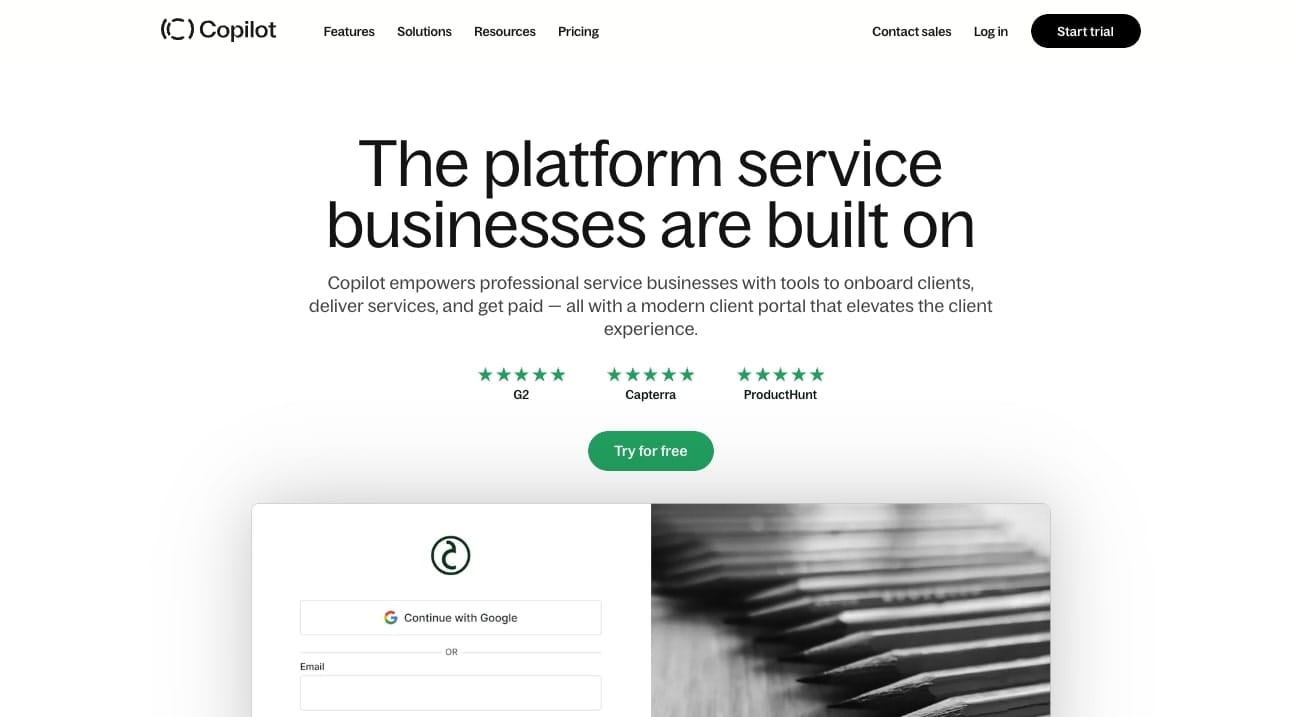
- Best for: Client portals and billing
- Pricing: Starts at $29 per month (billed annually)
Assembly is an all-in-one client portal and service business management tool. You can think of it as the main control center for all of your client interactions. It allows you to make your service business feel more like a SaaS (software as a service) business by allowing your clients to log into their own dashboard to view project statuses, outstanding requests or messages, and manage their payment methods.
From automating your onboarding process to delivering your services and getting paid, you can do it all with Assembly. And the thing that many agencies love about the platform is the fact that it is extensible and has an App marketplace. This allows you to integrate Assembly with many of the existing tools you may already use (including some of the tools on this list).
If you’re looking for a platform to manage your service business, you should definitely play around with Assembly’s demo portal.
Assembly’s core features
Here are some of Assembly’s core features that make it a great client portal tool:
- White-label portal where clients can log in or sign up on their own
- A billing app that allows for invoicing and subscription setup through Stripe
- A contracts app that allows you to generate templates and e-sign documents
- A messages app that integrates with email
- A forms app that allows you to create client intake forms
- An app marketplace that integrates with third-party apps
There are also a ton of other small features that make Assembly a great tool for marketing agencies. You can check out more by going to the marketing agency landing page here.
Assembly user reviews
Assembly is used by thousands of service-based businesses across the world. However, it’s most popular with marketing agencies and accounting firms. Here’s what real customers rate the platform on third-party review sites:
- G2: 4.8/5 star rating (from +141 user reviews)
- Capterra: 4.9/5 star rating (from +19 user reviews)
2. Clay

- Best for: Outbound marketing
- Pricing: Free for up to 100 credits, then starts at $149 per month
Clay is a newer tool on the market that has been growing really fast — mostly from word-of-mouth. It’s an outbound marketing tool that allows you to find and qualify potential leads and clients for your agency.
Its main value proposition is that you can use the tool to automate data collection for finding candidates that match your ICP (Ideal Customer Profile) for your agency services. From there, you can also use Clay to send hyper-personalized emails at scale.
This process allows you to amplify your outbound marketing strategies to help attract new clients for your agency.
Clay’s core features
Clay has all the features you need to run your outbound marketing efforts. It’s probably the reason why it's grown quickly and is currently outshining many of the existing traditional email outreach tools.
Here are some of Clay’s core features that make it great:
- Data providers: This is a Clay feature that allows you to mold your dream list of prospects into a spreadsheet. You get access to 50+ data providers to help you find your ideal clients.
- Waterfall enrichment: This feature allows you to find phone numbers, emails, and other contact information to help enrich your lead prospecting lists.
- Templates: Clay has a template marketplace that allows you to create custom email outbound campaigns based on different scenarios.
Clay user reviews
Here’s what real customers of Clay have to say about the platform on third-party review sites:
- G2: 4.9/5 star rating (from +136 user reviews)
- Product Hunt: 4.9/5 star rating (from +173 votes)
3. Webflow
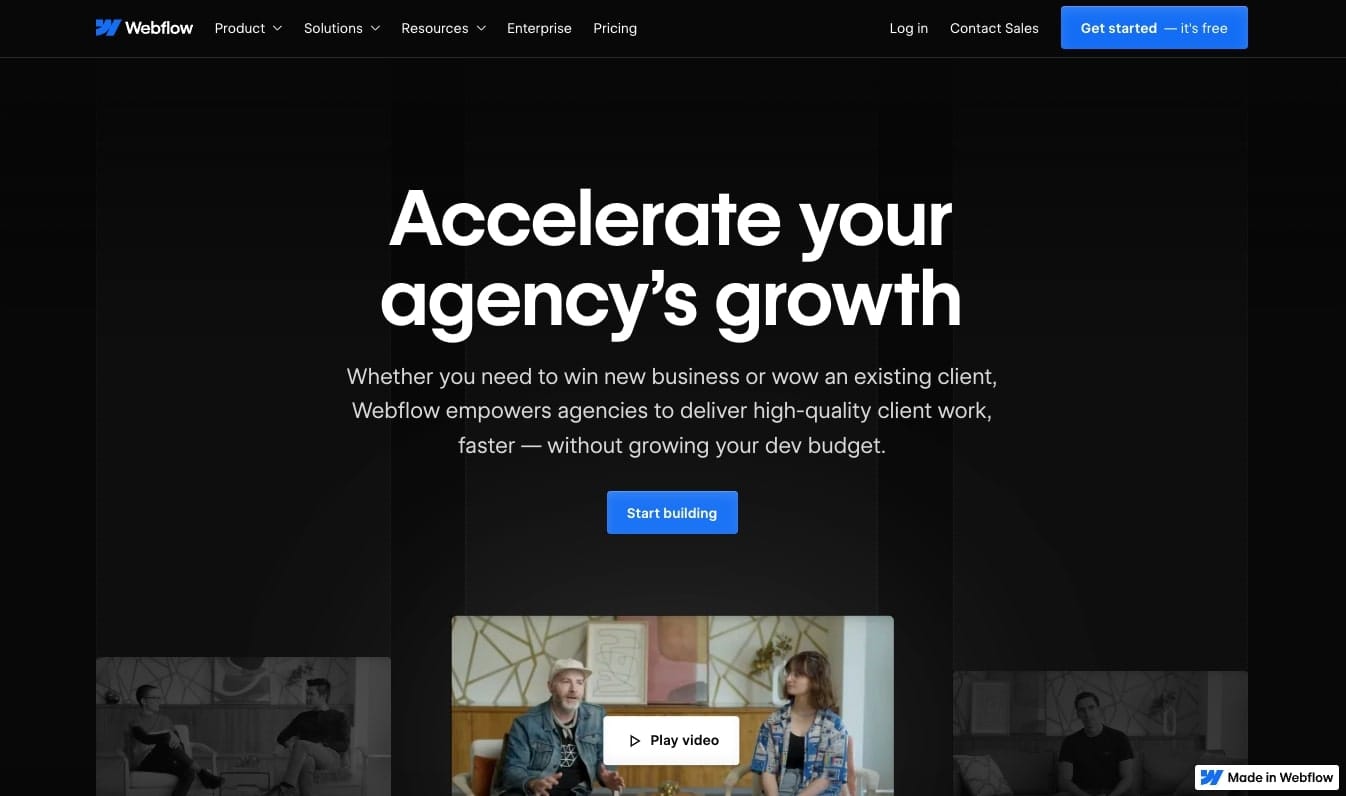
- Best for: Building your agency website
- Pricing: Free for a static two-page website, then starts at $29 per month for CMS capabilities
Webflow is a visual website builder that allows you to create literally any custom website. Webflow’s main value proposition is that you can design any website without knowing how to code. You do the designing, and Webflow does the coding (and gives you the option the export the code).
Webflow is used by many freelancers and agencies. In fact, there are tons of marketing agencies that offer Webflow development as a service. But, there are also a lot of agencies that use it for their marketing website. The great thing about Webflow is that it’s super flexible. You can either design a website from complete scratch or use one of their marketing agency templates.
You can also pair Webflow with Assembly to create an all-in-one experience for you and your clients. Your Webflow website acts as a place for you to market your services (the front-end), while your Assembly portal acts as a dashboard for your clients (your back-end).
Webflow’s core features
Webflow has too many features to write out in this article. But, here are some of the core features that make it great:
- Complete design freedom to create any type of website
- One of the most flexible CMSs on the market
- Built-in SEO features to make Google love your website
- A wide range of templates and cloneable assets to build your website
These are just the tip of the iceberg. If you want to learn more about what Webflow can do for your agency, be sure to check out their website.
Webflow user reviews
Webflow is a widely popular tool — they have over 3 million users. Given its popularity, you should take reviews on third-party sites with a grain of salt. Here’s what some popular review sites rate Webflow:
- G2: 4.4/5 star rating (from +559 reviews)
- Capterra: 4.6/5 star rating (from +237 reviews)
4. Notion
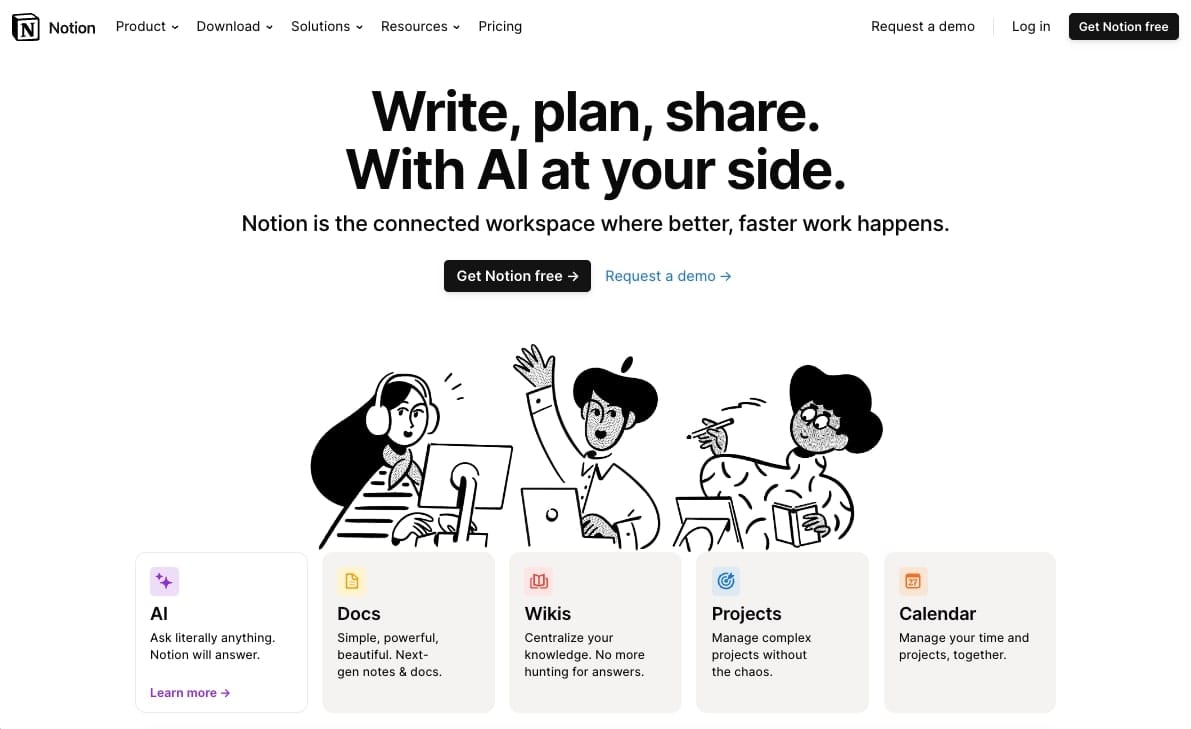
- Best for: Internal knowledge base
- Pricing: Free for personal use, then $8 per month per user for small teams
If you’re a tech-focused marketing agency, there’s a good chance you’ve heard about Notion. Notion is a project management and knowledge base tool that allows agencies to not only manage their projects internally but also help with documentation for your team members.
Notion’s use cases are endless. It’s sort of like a blank canvas that you can use for almost any type of business, or even for personal use. I personally use Notion for all of my client work, my own website projects (to manage content calendars), and all of my clients use it internally as their company knowledge base.
Notion’s core features
At its core, Notion is a project management tool. However, as the company has grown, they’ve branched out into AI tools, calendar tools, and documents — going head-to-head with products like Google Drive.
Here are some of Notion’s standout features:
- An integrated AI assistant
- A notes and docs app
- Company Wiki for your internal knowledge management
- Calendar app to organize both your personal and professional calendar
With these core features, you can build out almost any workflow you need for your marketing agency.
Notion user reviews
Here’s what some people have to say about Notion on third-party review sites:
- G2: 4.7/5 star rating (from +5,261 reviews)
- Capterra: 4.8/5 star rating (from +2,155 reviews)
5. Ahrefs
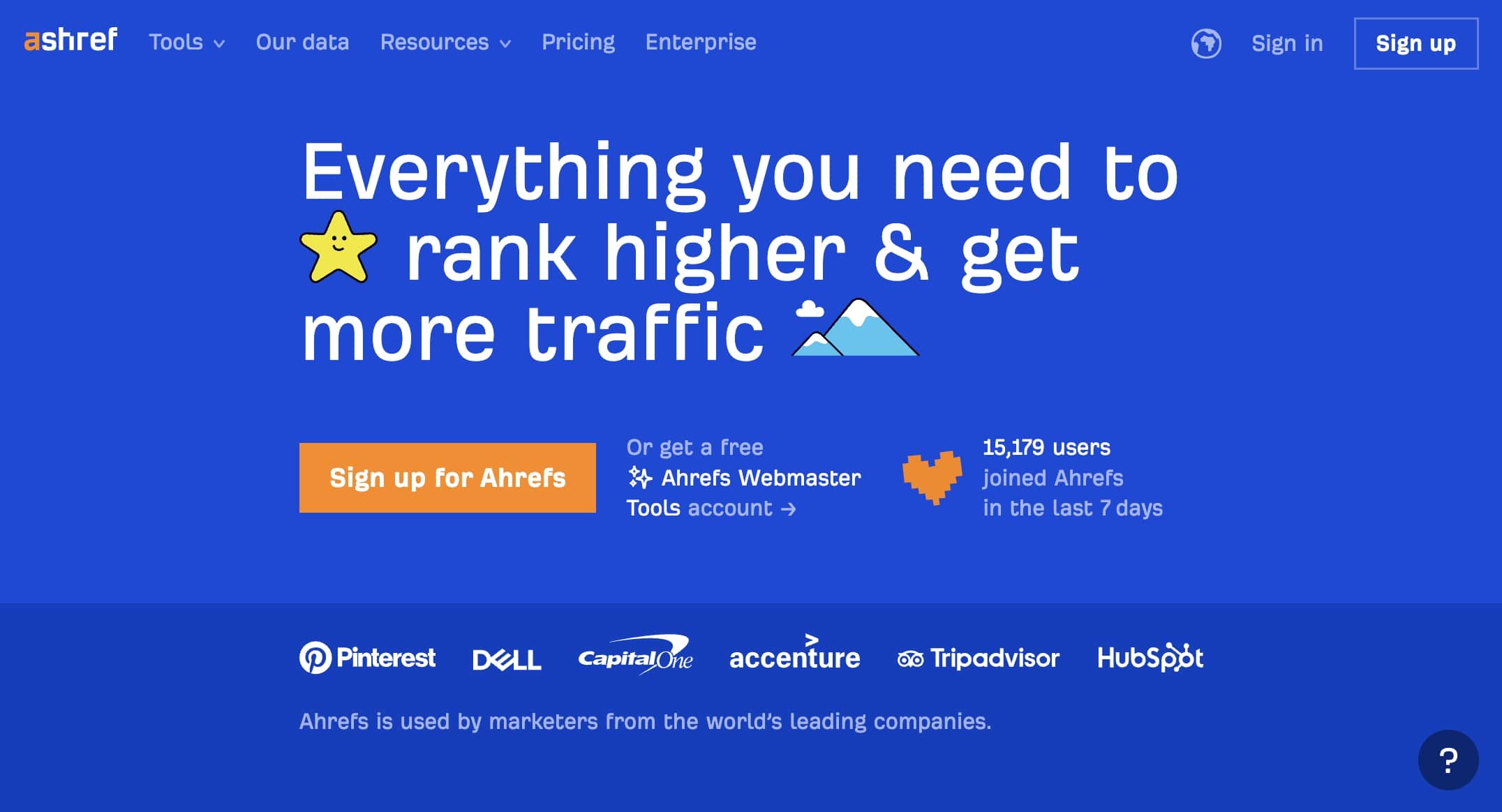
- Best for: SEO analysis
- Pricing: Starts at $99 per month
Depending on the types of services you offer, you might want to look into adding some SEO tools to your agency tech stack. Even if you don’t sell SEO services, some of these tools can be great for your own website.
One of the tools I use on a daily basis is Ahrefs. I love it because they have a centralized dashboard where I can see SEO analytics for all of my client’s websites and even my own website. I can also integrate Google Search Console data with Ahrefs so I know I’m getting an accurate source of truth on all things SEO-related.
Ahrefs’ core features
Ahrefs has many features that make it great. Here are some of the core features I use all the time:
- Site Explorer: This allows you to analyze competitor sites to see their traffic, what keywords they’re ranking for, and their backlinks.
- Dashboard: This is a main control center that allows you to quickly glance at analytics and see if things are trending upwards or downwards. I check this almost every morning.
- Keyword Explorer: A standard keyword research tool that allows you to generate keyword and topic ideas.
There are some other features like rank tracking and content brainstorming tools, but the features I mentioned above are probably my most used ones.
Ahrefs user reviews
Here’s what Ahrefs users rate the platform on third-party review sites:
- G2: 4.5/5 star rating (from +525 reviews)
- Capterra: 4.7/5 star rating (from +556 reviews)
6. Looker Studio
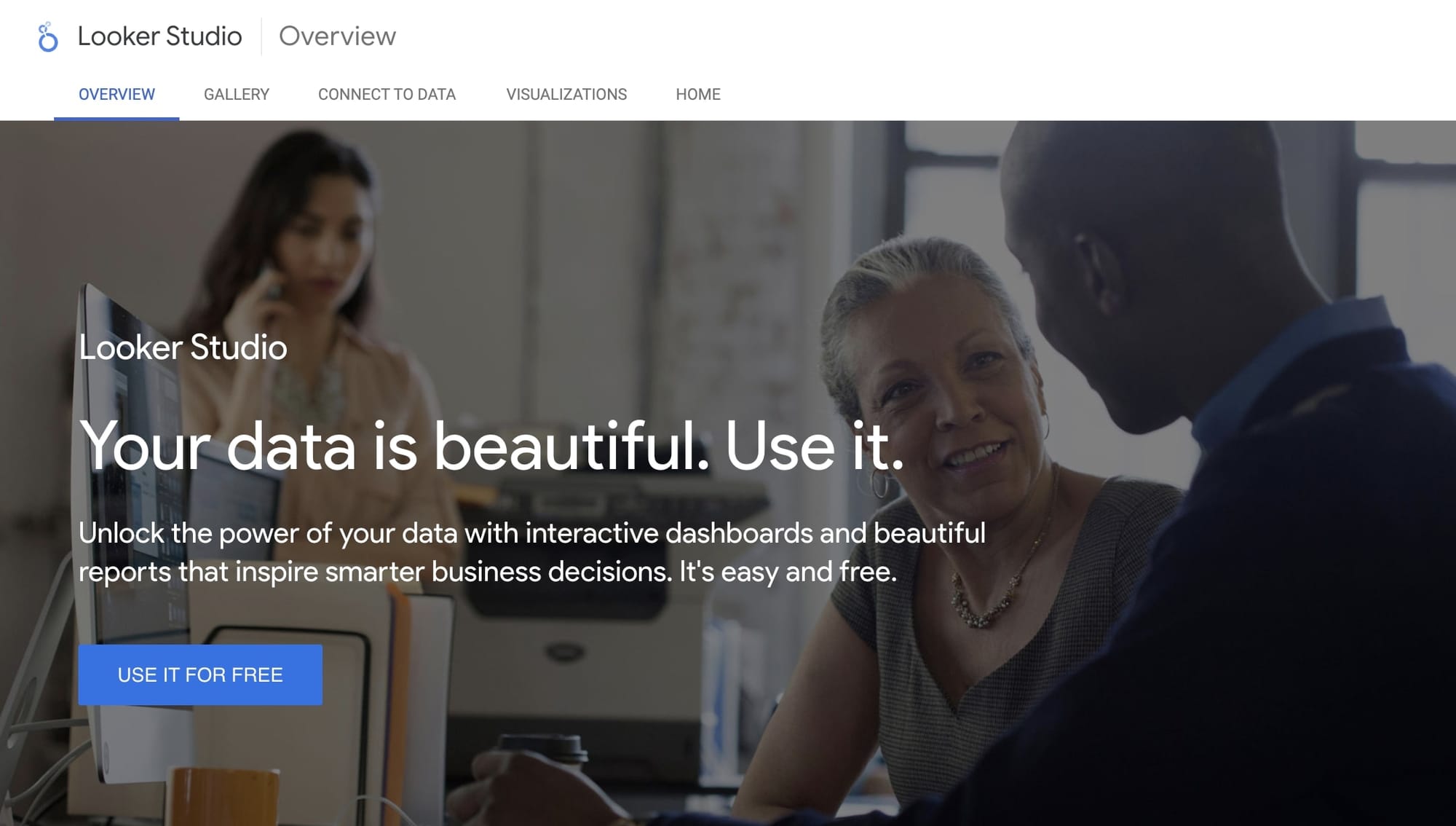
- Best for: Reporting dashboards
- Pricing: Free
Looker Studio is at the core of all of my reporting dashboards. It’s such a versatile tool that can integrate with different data sources (like GA or Search Console) and you can create filters and custom analytics reports.
I also love using Looker Studio because I can easily integrate it into my client’s Assembly client portal. So, they can log into their portal and easily see how their website and organic traffic is doing.
Looker Studio’s core features
Looker Studio is great for creating custom reporting dashboards. Here are some of its core features:
- The ability to connect with many different data sources outside of just Google’s suite of products.
- The ability to create data visualizations through a drag-and-drop editor — no extensive coding knowledge required.
- Sharing features that allow you to share read-only reports with your clients, while giving your internal team editing access to make changes to any reports.
Looker Studio user reviews
Here’s what some users of Looker Studio (formerly Google Data Studio) have to say about the tool:
- G2: 4.4/5 star rating (from +420 reviews)
- Capterra: 4.6/5 star rating (from +235 reviews)
7. Clearscope
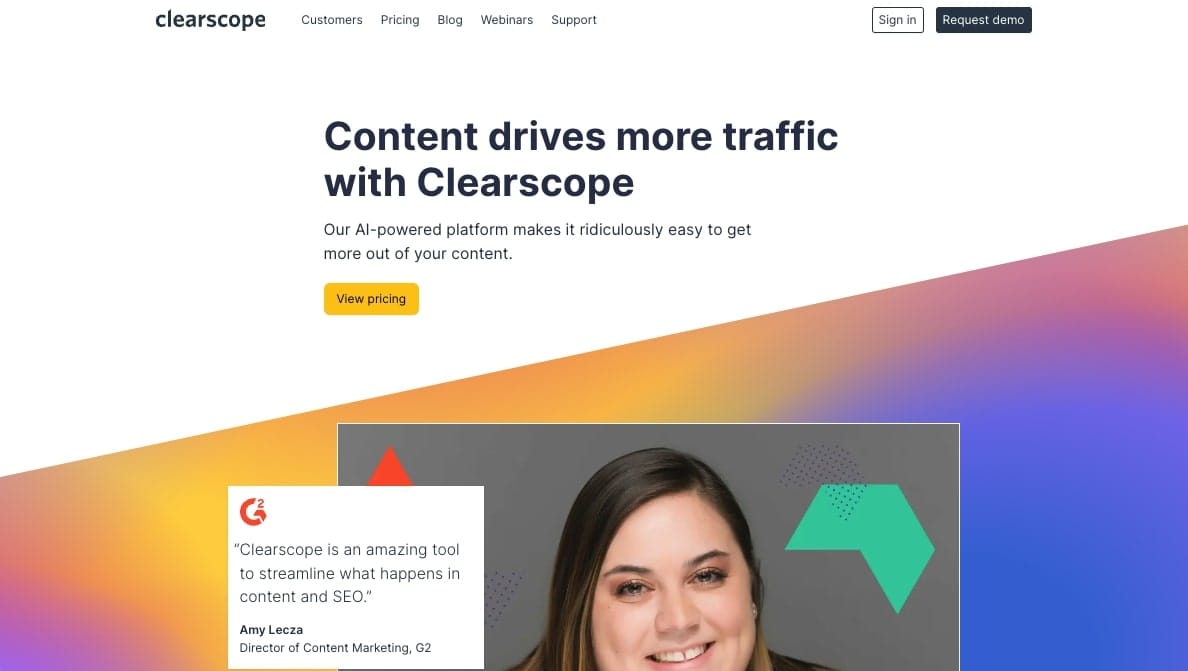
- Best for: Creating SEO-optimized content
- Pricing: Starts at $199 per month
Clearscope is one of my all-time favorite tools when it comes to writing blog posts. I’m literally using it to write this article right now.
Clearscope is a content optimization platform that gives you recommendations on what LSI keywords to use when writing about a specific topic. Just like Ahrefs, this tool might not be necessary unless you’re providing content marketing or SEO services. But, it can be used if you’re writing SEO content to help bring visibility to your own agency.
Clearscope’s core features
I’ve been paying for Clearscope for over 5 years now and over time, its feature set has increased. Here are some of its core features I love:
- AI content recommendation
- Content decay features
- Rank tracking features
Clearscope user reviews
Here’s what customers of Clearscope have to say about the platform:
- G2: 4.9/5 star rating (from +90 reviews)
- Capterra: 5/5 star rating (from +60 reviews)
8. Ordinal
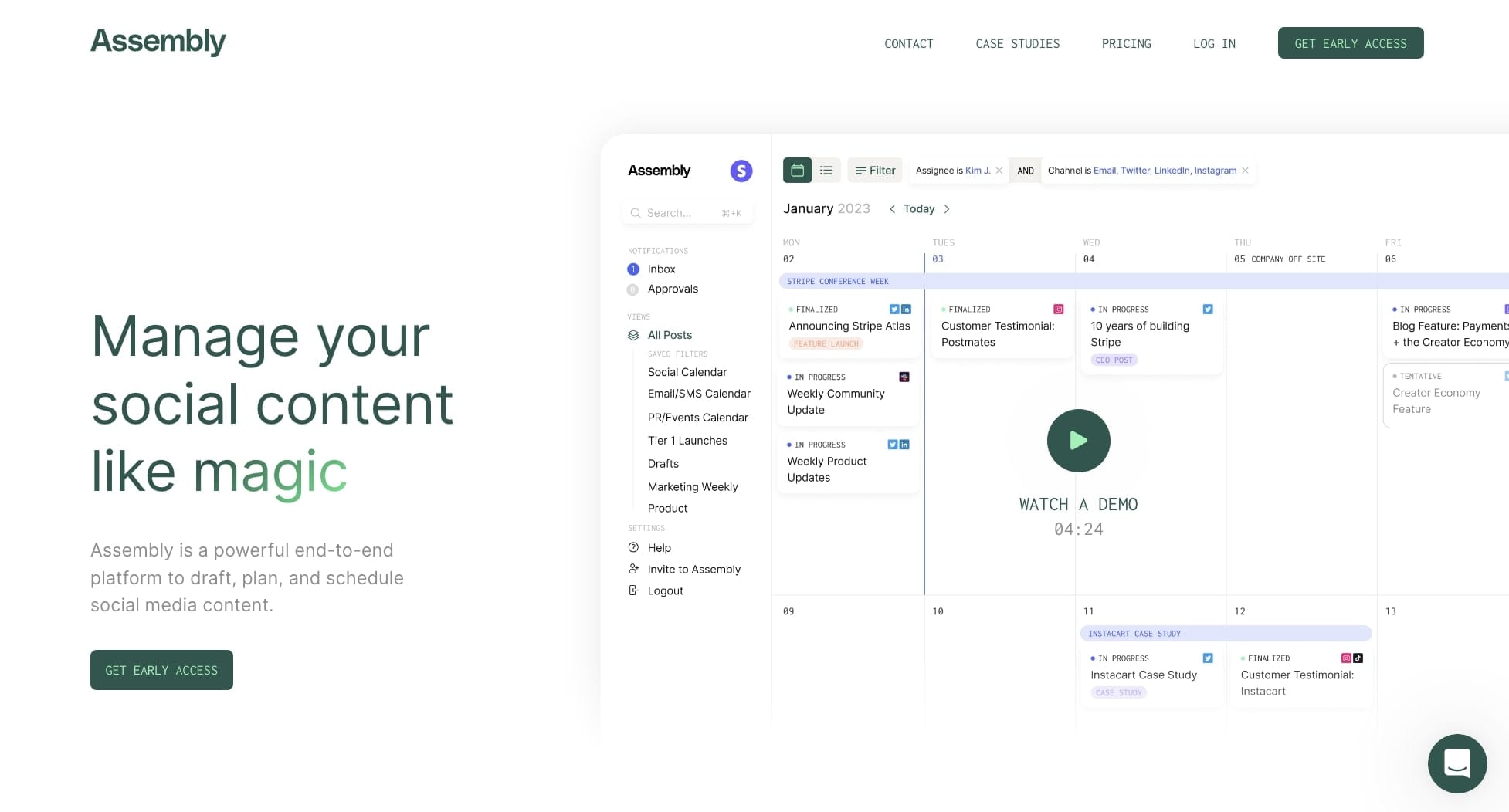
- Best for: Social media management
- Pricing: Starts at $50 per month
Ordinal is a new player on the block that’s quickly gaining praise for being a simple, yet effective, social media management platform. Compared to some other social media management tools that offer the same features, Ordinal's prices make it very appealing to small businesses and lean startups.
With Ordinal, you can go beyond just scheduling social media posts. You can connect all of your social media accounts in one place to make cross-posting a breeze. This makes it a great platform if you’re running a social media marketing agency and have clients that are all across Facebook, TikTok, LinkedIn, X, and more.
The tool also has a “Notion-like” editor and can sync with CMSs like Webflow. So if you’re using Webflow as your main website builder, adding Ordinal to your agency stack makes everything connect together seamlessly.
Ordinal's core features
Here are some of Ordinal's core features that customers love:
- Social media post-scheduling
- Simple and beautiful content calendar
- A clean editor to create content
- Team collaboration tools so multiple team members can interact with the platform
Ordinal user reviews
Ordinal is still in early beta, so there aren’t any reviews of the platform on third-party review sites yet.
9. Proposify
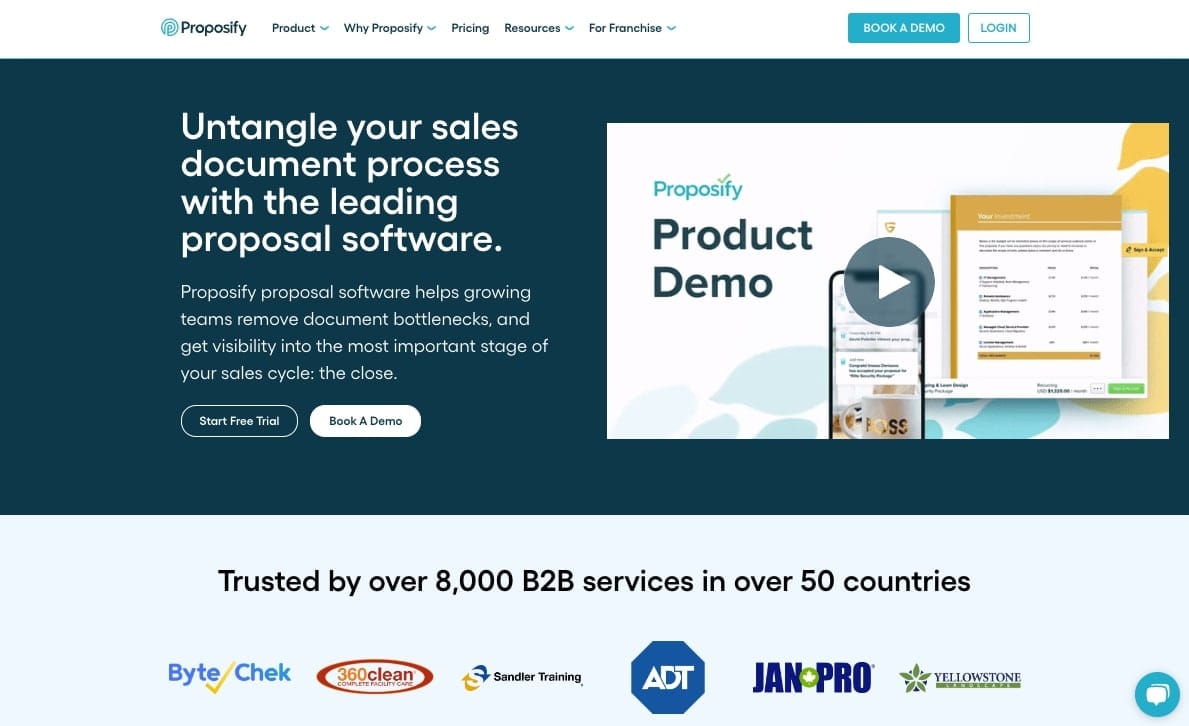
- Best for: Creating and sending proposals
- Pricing: $49 per month (billed quarterly or annually)
Proposify is a tool designed to help marketing agencies streamline their proposal creation process. From creating proposals, sending them, and tracking statuses, Proposify can do it all.
Whether you’re the one sending proposals, or you have a dedicated sales team, Proposify has all the right features of different sized companies.
Proposify’s core features
Here are some of Proposify’s core features:
- Easy proposal creation
- Real-time tracking to see if clients opened your proposals
- E-signature and CRM (Customer Relationship Management) features
Now, let’s look at some of the reviews.
Proposify user reviews
Let’s look at what customers of Proposify rate the tool on third-party review sites:
- G2: 4.6/5 star rating (from +975 reviews)
- Capterra: 4.5/5 star rating (from +275 reviews)
10. Zapier
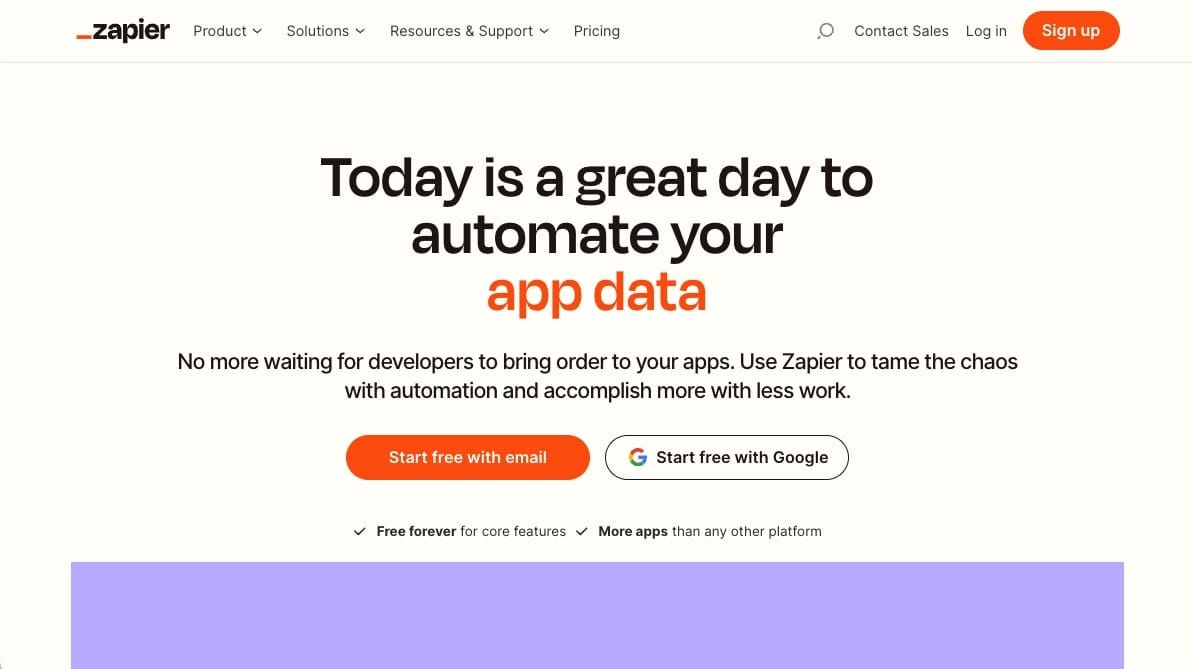
- Best for: Creating automations
- Pricing: Usage based on tasks. Starts at $0 for 100 tasks per month. Then, starts at $29.99 per month for multi-step tasks (at 750 tasks per month).
Zapier is the glue to many of the tools and processes of your agency tech stack. It’s an automation platform that is designed to connect different web apps to help you automate your workflows.
For example, you could set up a “Zap” that sends you a Slack message when a new invoice is paid. Or, you can create a workflow to automatically add a client to your CRM once a proposal is sent.
You can also use Zapier for internal workflows that require repetitive tasks, like inviting someone on your team to review a project once a task within that project is set to a certain status. The possibilities are literally endless with Zapier. And it’s no wonder it's a multi-billion dollar company with millions of users. (I personally have Zaps set up everywhere in my business that runs every single day.)
Zapier’s core features
Here are some of Zapier’s core features that many users love:
- Connects to thousands of apps
- No coding knowledge is required to set up automations
- Scalable features for different types and sizes of businesses
Zapier user reviews
Let’s look at what customers of Zapier rate the tool on third-party review sites:
- G2: 4.5/5 star rating (from +1,251 reviews)
- Capterra: 4.7/5 star rating (from +2,806 reviews)
Conclusion
As you can see, there are tons of different tools you can use for your marketing agency tech stack. Everything from finding clients, helping you manage them, delivering your services, and getting paid can be automated with tech.
Whatever type of digital marketing agency you are, from email marketing to SEO, I hope this list of tools gave you some insight into how you can automate the day-to-day workflows. Remember that your agency is not based on the tools it uses. The value of your agency is what you can do for your clients. But, while tools won’t make or break your business, the right technology can help remove unnecessary headaches along the way.

